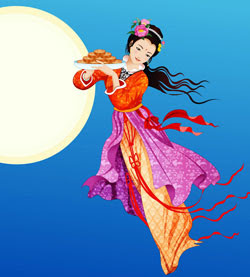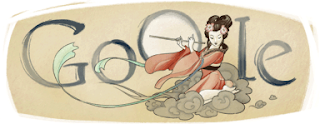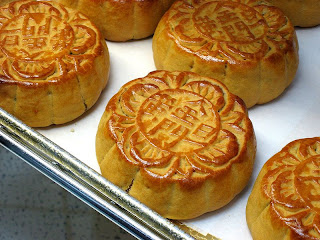
Today (Wednesday), tomorrow and Friday I don't have to teach because of Mid-Autumn Festival. Wednesday is the actual holiday because it is the day when the moon is full (the Chinese follow the lunar calendar for everything). In China, Mid-Autumn festival is a day to eat with family, share mooncakes and admire the beauty of the moon. Wikipedia says, "The festival is for lunar worship and moon watching; moon cakes are regarded as an indispensable delicacy on this occasion. Mooncakes are offered between friends or on family gatherings while celebrating the festival. The Mid-Autumn Festival is one of the four most important Chinese festivals." So there you have it.

Sean and I spent the day hanging out, relaxing and eating sushi that we had delivered with some help from our Chinese-speaking friend (thanks Qin Chen!) We might crack open our boxes of moon cakes later on and glance at the moon if the spirit moves us. The moon might prove to be rather elusive, however, since it has been cloudy and rainy all day - the temperature took a sharp and surprising drop from a humid and sticky 95 degree weather to cool 60s. I was both happy and sad: happy because I'm a bit weary of being permanently slimy with sweat which then proceeds to act like glue for chalk dust but sad because it means that frostbite is on the way (this year I came prepared with new boots and a long down jacket). Unfortunately, Changzhou seems to live not in the lovely in-betweens of weather like spring and fall but rather only in the extremes.

Back to moon cakes - although they are very pretty to look at, they can be an adventure for the taste buds. Basically, they are some kind of dough or crust with a filling which is usually red bean paste or lotus seed paste. But really, moon cakes can be filled with anything and businesses like Dairy Queen are capitalizing on this newly-commercialized traditional holiday; now you can buy ice cream mooncakes! For the people with more money to spend you can buy Peking duck-filled mooncakes or cakes filled with jellyfish, bird's nest or shark's fin. Though they are usually sweet, mooncakes are also commonly salty or spicy (which can be a bit of a disappointment if you are like me and hoping for something akin to a donut). In addition, they are usually stamped with some kind of auspicious Chinese character like "happiness" or "good health" and "good fortune".

I am a bit fascinated by the whole mooncake thing. When I ask my students about it they say that everyone gives them and gets them during this holiday but not many people eat them anymore. When I question them as to the purpose of giving them if nobody eats them, they reply that it is just something that is done, it's a tradition, it's respectful etc. I guess it might be like sending Christmas cards or giving a fruitcake - everyone appreciates these gestures but you can't really do anything with them. My other question is what everyone does with them after the festival if they don't eat them; I imagine some motivated entrepreneurs might cash in on the business of recycling uneaten mooncakes or re-using still-new bags and boxes. It could be huge business.

As with many other things in China, it's all about the "look" - presentation is everything. Other people I have talked with about mooncakes say that the actual taste of the mooncakes doesn't really matter, rather it is the brand of the company, the cost and the packaging that really shows your generosity. Companies make mooncakes to fit any budget and there are some that cost about a dollar to some (in real gold boxes) that go for over $1000 a box.


I've included some pictures of the impressive bag and box of mooncakes that the school gave me during our last meeting. I'm thinking about cracking them open and sampling a few before I head off to bed, but I'm kind of wary as to what flavors they are. You never really know what you will be biting into. I guess you could say life is like a box of mooncakes . . .

















So cute, Sarah! :) Thanks for the post - really interesting! I hope that you get lots of great mooncakes!